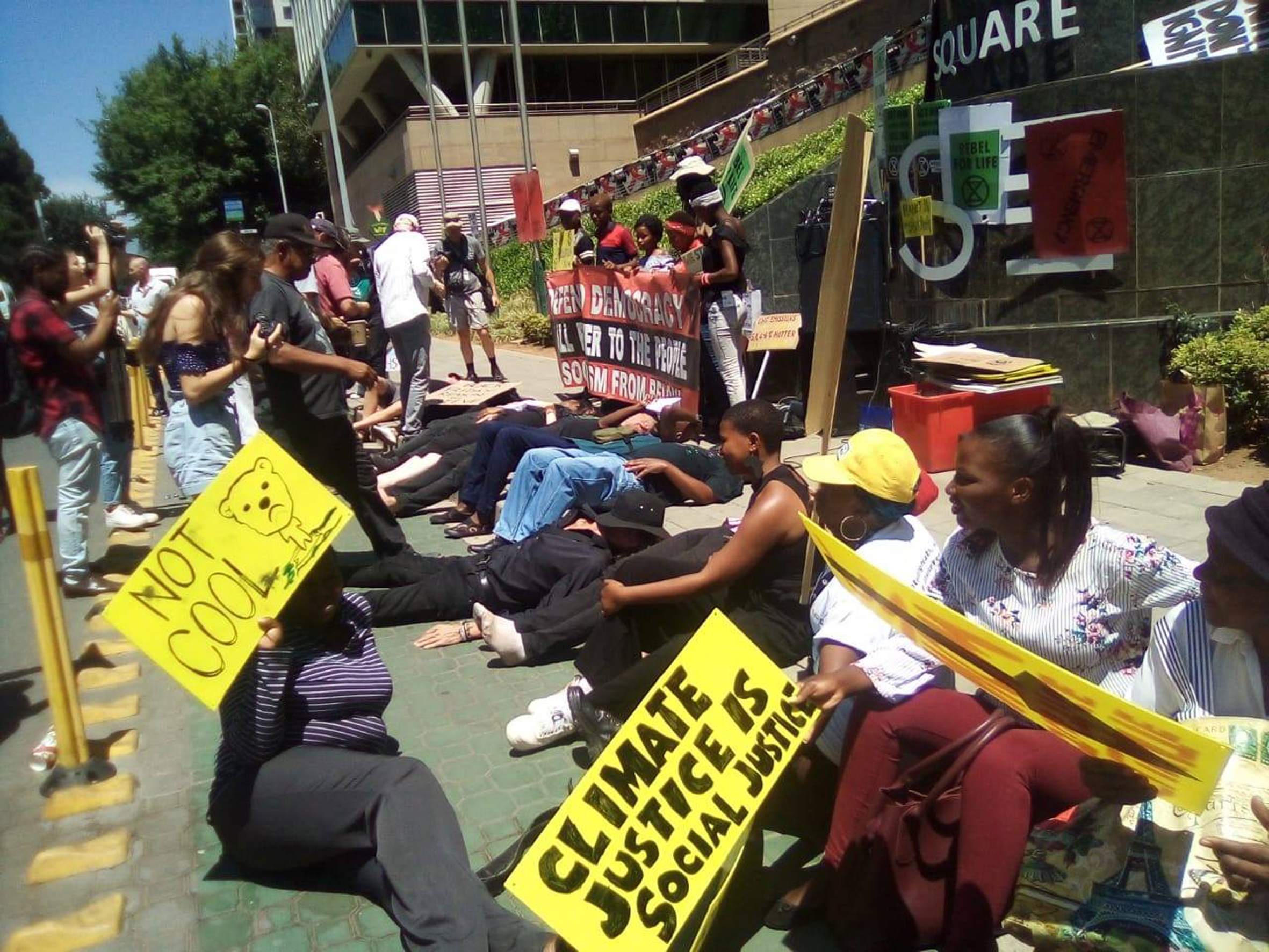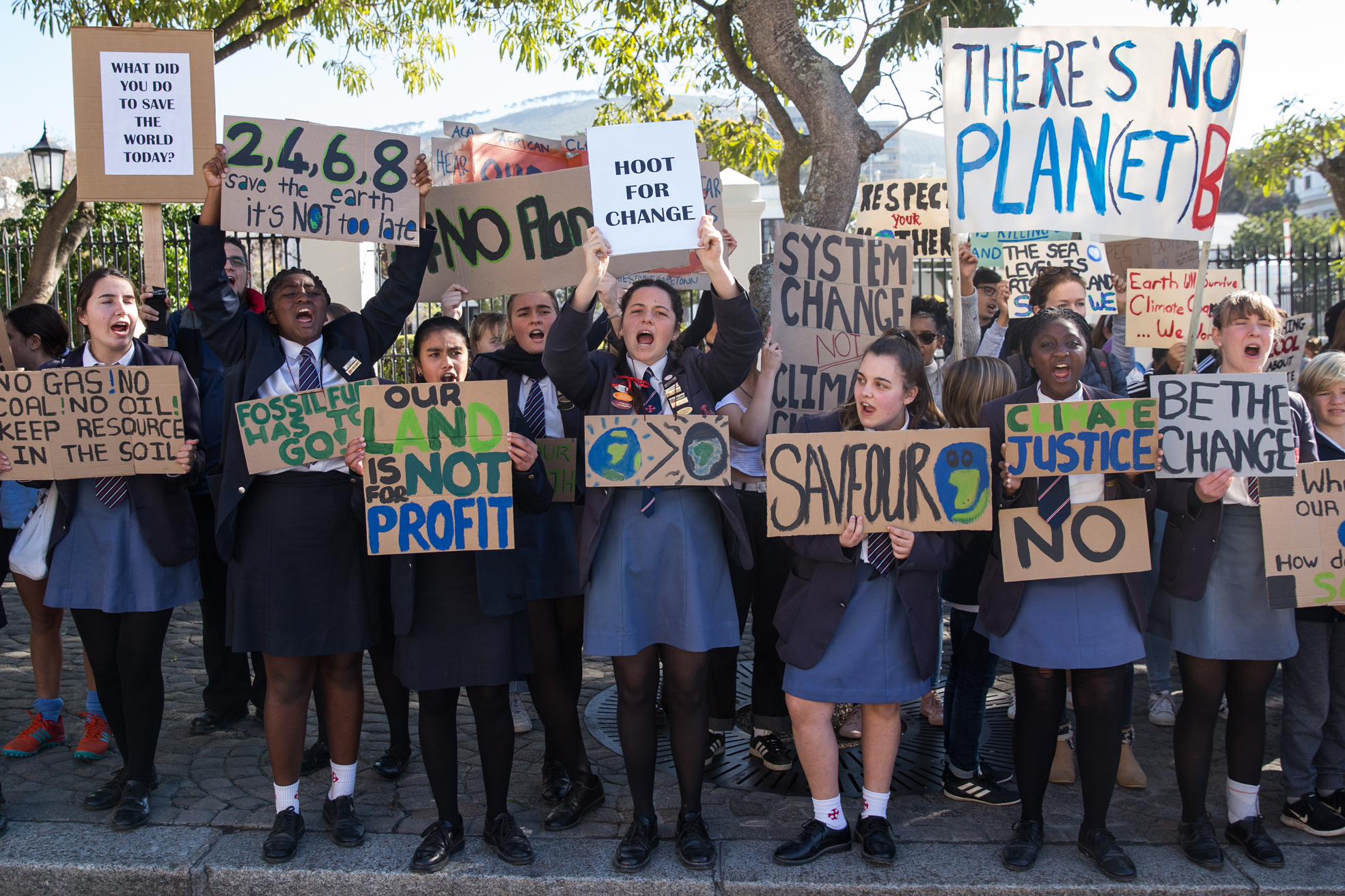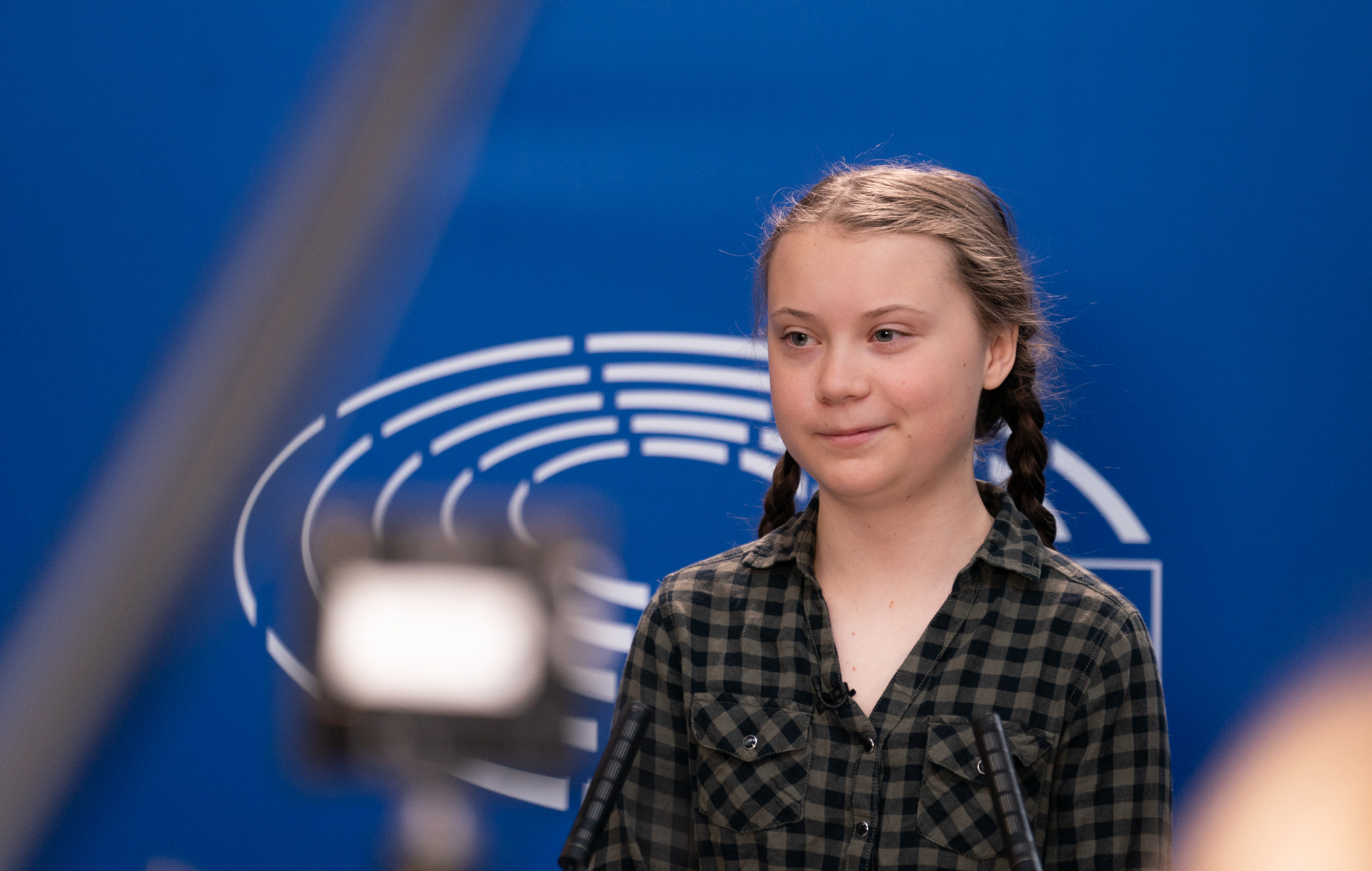Nicole Anthony (16), from Lotus High, said she joined the protest because we are the future. If nothing changes, there will be no food and we will die. (Photo: Ashraf Hendricks, courtesy of GroundUp)
The climate emergency is not a future problem, it is affecting us now. People are suffering and dying for it today, said 16-year-old climate activist Greta Thunberg in her opening speech at COP25. Despite climate change having already had devastating consequences, few, if any, countries are making sufficient changes to halt global warming — and it is the world’s children who are being forced to hold the world’s leaders to account.
The main challenge for COP25 negotiators was the uncertainty over a provision in the 2015 Paris agreement called Article 6, which puts a price on carbon emissions, therefore allowing them to be traded between countries. Meantime, the real issue — how fast the world needs to cut greenhouse gas emissions — received little official attention. Global net carbon emissions have to decrease by 7.6% every year, eventually reaching zero by the year 2050, but the world does not seem to be waking up to the fact there is an emergency unfolding.
 The Extinction Rebellion South Africa has organised several protests, including this one outside the JSE
The Extinction Rebellion South Africa has organised several protests, including this one outside the JSE
As the COP25 negotiations proceeded at a snail’s pace, about half a million people marched through Madrid last weekend, led by Thunberg. Among the protesters were representatives from the Extinction Rebellion, along with other climate activist groups from across the world. Addressing Cop25, Thunberg urged the media to pay more attention to other young climate change activists: “It is people especially from the Global South, especially from indigenous communities, who need to tell their stories.”
Organisations are springing up across the world to provide platforms for the voices of young people, angry at what the adults are leaving behind for them. Several governments, including Chile, Costa Rica and Spain, have signed an international declaration that the climate emergency is a crisis when it comes to upholding children’s rights. The organisers and the United Nations Children’s Fund (Unicef) hope that this will encourage countries to include special consideration for children in their climate action plans.
Africa and climate change
COP25 delegates heard that African countries need significant financial and material assistance to cope with climate change. Although Africa is responsible for only 4% of global carbon emissions, it is suffering the worst effects of climate change. Many Southern African countries are already suffering from a severe drought, and some scientists believe temperatures will increase twofold on the continent, compared to the rest of the world, if climate change isn’t mitigated. Africa, it seems, is paying for an issue that it did not create.
Scientists say people in Africa will likely be among the hardest hit by climate change over the coming decades — and will have the least capacity to deal with the impact. A report from Britain’s Meteorological Office and Leeds University warns that climate change caused by the burning of fossil fuels will bring chaos to Africa, with bouts of severe drought and flooding becoming the norm.
Stateswoman and activist Graça Machel points out in a recent Time magazine article that her home country, Mozambique, has already been devastated by cyclones Idai and Kenneth, but the authorities there don’t just have to repair the damage, they have also to prepare for the future. This means converting to renewables. But, as Machel points out, many international energy investors are still financing fossil-fuel projects in Africa.
Governments in Africa must be more assertive in pushing for cleaner energy and action on climate change, rather than simply accept external aid regardless of the strings attached, said Machel. In Kenya, judges have halted plans to construct a 1 050MW coal-powered plant near the coastal town of Lamu, a Unesco World Heritage Site. The China-backed power station would have increased the country’s greenhouse gas emissions by 700%, activists said, and would have had dire economic and health effects for local residents.
 Schoolchildren marched in Cape Town, Durban and Pretoria in June and September, to demand that the South African government address the issue of climate change. (Photo: Ashraf Hendricks)
Schoolchildren marched in Cape Town, Durban and Pretoria in June and September, to demand that the South African government address the issue of climate change. (Photo: Ashraf Hendricks)
What is SA’s youth doing?
In South Africa, the lobby group Youth@SAIIA (South African Institute of International Affairs) issued a statement to COP25, which was also presented at the National Climate Change Stakeholder Dialogue in Johannesburg in October.
The statement emphasises the urgent need for action to build a climate-resilient South Africa. It urges governments to declare climate change as a global crisis for the sake of future generations, and to make ambitious commitments — and enhance commitments already made — towards halting the pace of climate change.
Youth@SAIIA’s statement applauds and supports certain strides made by the South African government with regard to climate change, including the introduction of the carbon tax and the work being done to ensure that the Climate Change Bill is passed.
It calls for greater numbers of youth delegates at COP conferences, and for increased training of these delegates. It also calls for greater funding to address the effects of climate change at grassroots level, and for both the private and public sectors to implement greener technologies.
Perhaps most significantly, it urges the government to embrace youth-led and youth-focused initiatives that enable young voices from the Global South to be represented, especially internationally, where they lack a platform to be heard.
Children take to the streets
In June this year, hundreds of schoolchildren marched in Cape Town and Pretoria to demand that the South African government address the issue of climate change. The march was organised by the African Climate Youth Alliance and was part of the Fridays for Future climate protests initiated by young people globally. This followed a similar protest in March, in which thousands of children took part in Pretoria, Cape Town and Durban, according to news agency GroundUp.
Among other demands, the young protesters want government to publicly declare that the climate crisis is a reality and is happening in the here and now; to place a moratorium on new coal, gas and oil mining licences; to have 100% renewable energy by 2030; and for government to introduce a mandatory education curriculum on climate change.
Comments made by the marchers strike right to the heart of the matter. Nonku Ncube (14), from St Mary’s Diocesan School for Girls, said: “Climate change is important for the youth to care about because we are the ones who will be affected by it. It might not affect us right now, but it is going to affect our future, and if we don’t do anything about it, we might not have an Earth to live on.”
Jeffrey Mashela (15), a learner from Mamelodi East, said: “We should think about the next generation and how it is going to be for them. That is why we are here today, to make the government listen.” Dzunani Makwakwa, also from Mamelodi, said: “If the youth don’t stand up, change is not going to happen.”
Nicole Anthony (16), from Lotus High, said she joined the protest because “we are the future. If nothing changes, there will be no food and we will die”. When questioned on why there weren’t many adults at the protests, she said: “They already had their time.”
 Lily Shaw is on a permanent climate strike
Lily Shaw is on a permanent climate strike
Lily Shaw (13), a youth organiser for Extinction Rebellion Mzanzi, said that she was no longer attending school as she was “on a permanent climate strike”. She said that if no action was taken to ensure she had a future, “I’m going to be extinct as well as all the other humans and most of the species”. Shaw said that although climate change had become a popular focus in the media, “when it actually matters, we’re not really not doing anything about it”.
Fridays For Future
 Greta Thunberg is leading the charge against the climate crisis. (Photo: Wikimedia Commons)
Greta Thunberg is leading the charge against the climate crisis. (Photo: Wikimedia Commons)
#FridaysForFuture (FFF) is a people’s movement following the call from @GretaThunberg for schoolchildren to strike. The movement began in August 2018, after Thunberg sat in front of the Swedish Parliament every school day for weeks to protest against its inaction regarding the climate crisis.
School children are required to attend school, but as the FFF site points out: “With the worsening climate destruction, this goal of going to school begins to be pointless. Why study for a future, which may not be there? Why spend a lot of effort to become educated, when our governments are not listening to the educated?”
The site provides some basic guidelines on how, when and where to strike. Thunberg requests that people strike in front of their closest town hall every Friday, and with a sign, take a picture and post it, adding the hashtags #FridaysForFuture and #Climatestrike.
FFF advises children to “only strike in a way that you feel safe with” and advises strikers to liaise with local nongovernmental organisations before striking, “as they know local lawyers who are well versed in protest situations”. The site also warns that some individuals or organisations may try to join FFF strikes “for the purpose of causing trouble”. There are strict rules for FFF strikers: no violence, no damage, no littering, no profit, no hate; minimise your carbon footprint, and always refer to science.
Contact the South African branch of FFF on fridaysforfuture.org.za
Extinction Rebellion South Africa on xrebellion.org.za
350 Africa on 350africa.org
African Climate Youth Alliance on africanclimatealliance.org
A people-centred vision is gaining ground
National governments and other powerful actors have failed so far to deliver the sweeping policies and courageous decisions that would stop the world from burning up even further than it has so far. Emissions keep rising, investments in fossil fuels continue and the most vulnerable among us become more and more so by the minute. There are many reasons why this is happening, many reasons why governments are not acting according to what science dictates and what the people need. Apart from COP21, all other climate talks have often been characterised by hypocrisy, greed, empty promises and procrastination, with big polluters deliberately delaying and sabotaging any significant climate action. The influence of the fossil fuel lobby on our governments and on the climate talks themselves has made it so that real progress has been so far stalled, all to allow a few large corporations and national elites to prosper at the expense of everyone else.
We say “no more”.
As the climate crisis escalates, African decision-makers must heed the call of the people and urgently take action by focusing on solutions that eliminate fossil fuels and transition to clean and sustainable energy. At the village, city, district and country levels, people are coming together to challenge the power of the fossil fuel industry. Unions, faith groups and non-environmental groups are joining them to build alternative people-centred solutions. With the continuous energy technology innovations making renewable energy more accessible and affordable, we believe that Africa can and must lead the way in this watershed moment in history, by addressing the climate crisis while creating a more just and equitable world and generating millions of new jobs for its growing youth population powered by technologically advanced renewable sources.
Regardless of the outcomes of the current climate talks in Madrid, the fight against climate change will not stop. It’s clear that a just and rapid transition away from fossil fuels is within reach, in Africa just as anywhere else. In fact, the way we deal with the climate crisis matters as much as how rapidly we act. We cannot expect the climate crisis to be meaningfully addressed unless those in power start taking into consideration other social justice issues such as extreme poverty, extraction, neo-colonialism, lack of freedom and inequality. We cannot see the climate crisis solved without putting at the centre the very frontline communities affected by recurrent floods, droughts, environmental destruction, hunger and forced displacement. COPs will continue to be a failure as long as the UN allows fossil fuel industry lobbyists to walk its halls and to influence complacent politicians not to take the strong action needed against what the UN secretary-general himself calls an “emergency”.
This is an extract from a piece written by Landrey Ninteretse on 350africa.org